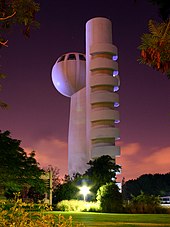|

Science,
technology and education

The particle accelerator at the Weizmann Institute of
Science, Rehovot
Main articles: Education in Israel and
Science and technology in Israel
See also: List of universities and
colleges in Israel
Israel has the highest school life expectancy in
Southwest Asia, and is tied with Japan for second-highest
school life expectancy on the Asian continent (after South
Korea). Israel similarly has the highest literacy rate in
Southwest Asia, according to the United Nations. The State
Education Law, passed in 1953, established five types of
schools: state secular, state religious, ultra orthodox,
communal settlement schools, and Arab schools. The public
secular is the largest school group, and is attended by
the majority of Jewish and non-Arab pupils in Israel. Most
Arabs send their children to schools where Arabic is the
language of instruction.
Education is compulsory in Israel for children between
the ages of three and eighteen. Schooling is divided into
three tiers – primary school (grades 1–6), middle
school (grades 7–9), and high school (grades 10–12) –
culminating with Bagrut matriculation exams.
Proficiency in core subjects such as mathematics, Bible,
Hebrew language, Hebrew and general literature, English,
history, and civics is necessary to receive a Bagrut
certificate. In Arab, Christian and Druze schools, the
exam on Biblical studies is replaced by an exam in Islam,
Christianity or Druze heritage. In 2003, over half of all
Israeli twelfth graders earned a matriculation
certificate.
Israel's eight public universities are
subsidized by the state. The Hebrew University of
Jerusalem, Israel's oldest university, houses the Jewish
National and University Library, the world's largest
repository of books on Jewish subjects. The Hebrew
University is consistently ranked among world's 100 top
universities by
the prestigious ARWU academic ranking. Other major
universities in the country include the Technion, the
Weizmann Institute of Science, Tel Aviv University (TAU),
Bar-Ilan University, the University of Haifa, The Open
University and Ben-Gurion University of the Negev.
Israel's seven research universities (excluding the Open
University) are consistently ranked among top 500 in the
world. Israel ranks third in the world in the number of
academic degrees per capita (20 percent of the
population). Israel has produced five Nobel Prize-winning
scientists since 2002
and publishes among the most scientific
papers per capita of any country in the world.

The world's largest solar parabolic dish at the
Ben-Gurion National Solar Energy Center.
Israel leads world in stem cell research papers per
capita since 2000. In addition, Israeli universities are
among 100 top world universities in mathematics (TAU,
Hebrew University and Technion), physics (TAU, Hebrew
University and Weizmann Institute of Science), chemistry
(TAU, Hebrew University and Technion), computer science
(TAU, Hebrew University, Weizmann Institute of Science,
BIU and Technion) and economics (TAU and Hebrew
University).
In 2009 Israel was ranked 2nd among 20 top countries in
space sciences by Thomson Reuters agency. Since 1988
Israel Aerospace Industries have indigenously designed and
built at least 13 commercial, research and spy satellites.
Most were launched to orbit from Israeli air force base
"Palmachim" by the Shavit space launch vehicle.
Some of Israel's satellites are ranked among the world's
most advanced space systems. In 2003, Ilan Ramon became
Israel's first astronaut, serving as payload specialist of
STS-107, the fatal mission of the Space Shuttle Columbia.
Israel has embraced solar energy, its engineers are on
the cutting edge of solar energy technology and its solar
companies work on projects around the world. Over 90% of
Israeli homes use solar energy for hot water, the highest per
capita in the world. According to government figures,
the country saves 8% of its electricity consumption per
year because of its solar energy use in heating. The high
annual incident solar irradiance at its geographic
latitude creates ideal conditions for what is an
internationally renowned solar research and development
industry in the Negev Desert.
wikipidia

|










